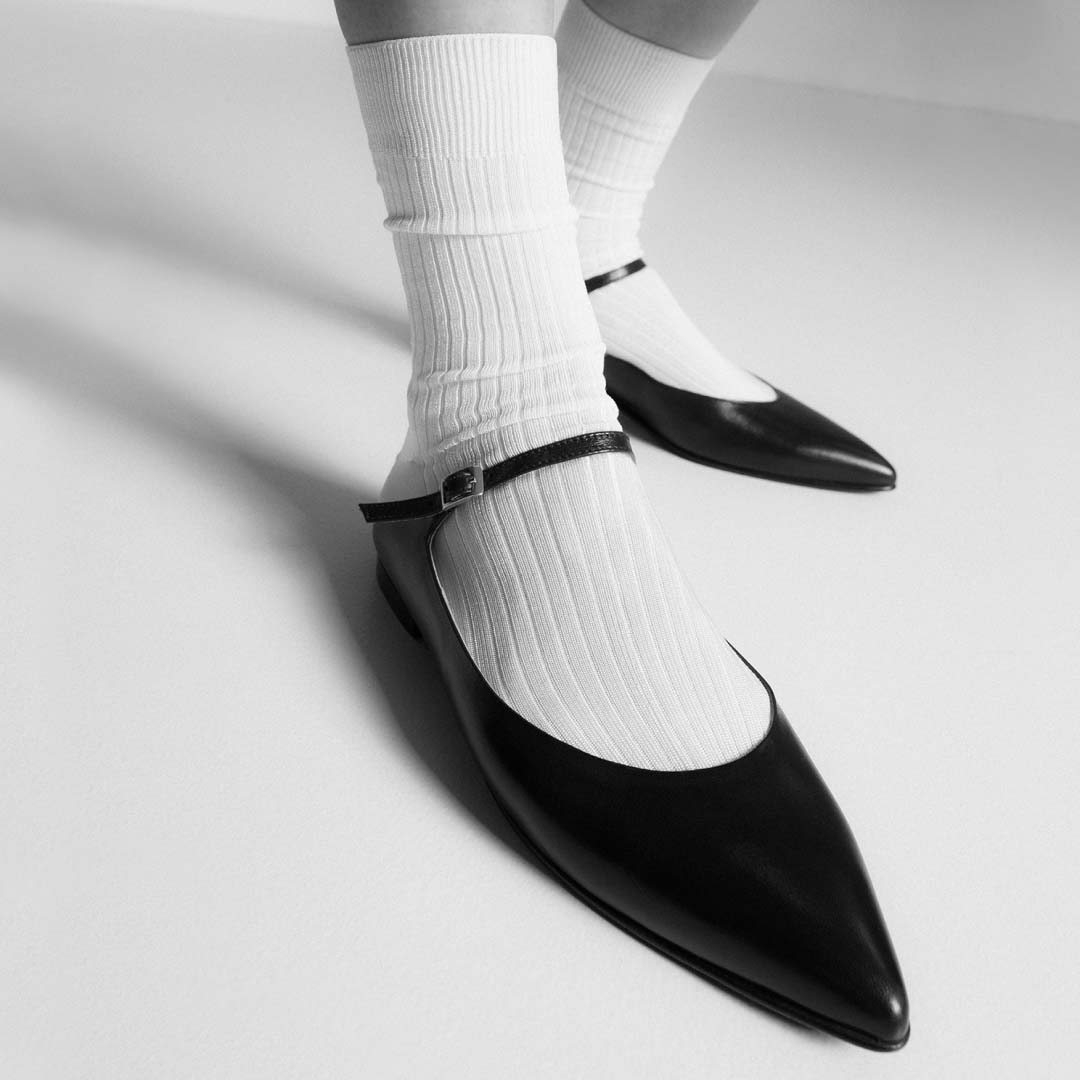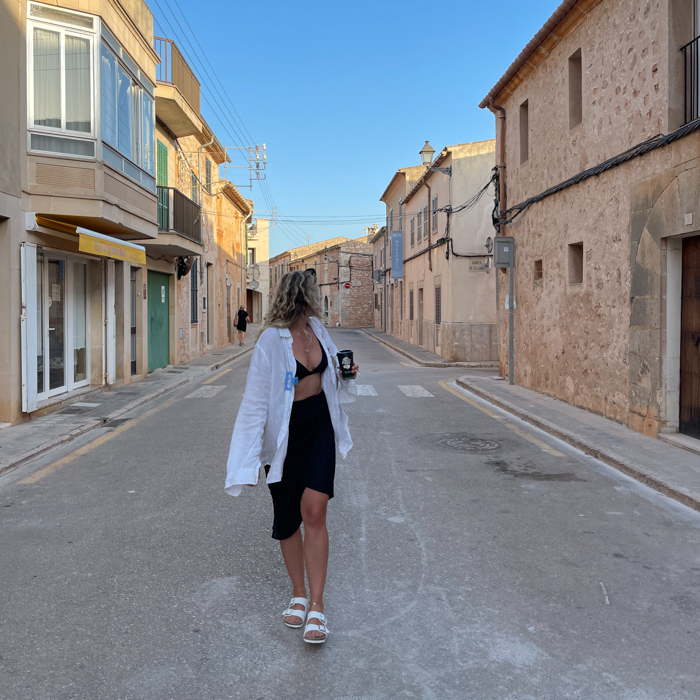“I founded ESSEN in 2016 as a response to a fashion cycle that overproduces more than it carefully crafts, chases trends more than it determines classics, and wastes more than it sustains. ESSEN encourages people to buy less, choose better, and wear longer. I aspire to simplify women’s wardrobes by helping them consider what they need and edit out excess. That’s where the name comes from – essentials,” explains Marre Muijs, founder and creative director of ESSEN.
Cover photo: © ESSEN
Marre Muijs
“I’m originally from The Netherlands, but while I was studying, I did an exchange program in Melbourne, and even though I didn’t know anyone and had never visited Australia before, I immediately felt at home,” tells Marre Muijs at the start of the interview. The young designer feels Australian in heart and soul now. “I moved back as soon as I graduated from university, and it’s the best decision I’ve ever made. When I look back, there are so many incredible people that I’ve met and memories made,” she adds.
After graduation, Marre didn’t exactly know what to do. She had several jobs in the fashion industry, but none felt the right fit. “It took me quite a bit of time to find my footing, if I’m honest. We now live in a world that encourages us to be the multifaceted humans that we are, but at the time, it made me feel a little lost. The more I worked in the industry, the more I understood how it was missing the mark and needed to redirect itself to be more responsible, considered, inclusive, and less compromising in its products and processes. I now understand that my early experiences have prepared me to run my own business, think outside the box, and forge my path, which I’m grateful for.”
Love for sustainability
Like the idea behind ESSEN, her love for sustainable fashion grew over time: “It’s something that has evolved gradually. My parents raised my siblings and me with a mindful approach and to be conscious of our footprint. Growing up, we would spend a lot of time outdoors, and they were resolute in cycling everywhere. I remember having a car as a family, but we barely used it. My mum is very creative and we didn’t have much money, so she often made our clothes or spent time repairing and caring for our wardrobes. It taught me to have a long-term relationship with my clothes and treat them with love so they would last longer.”
This approach led to a long-term mindset toward fashion, which is at the core of ESSEN. “Over time, I’ve built a wardrobe of core items instead of buying fast fashion. I’ve had some pieces in my wardrobe for over fifteen years, and I still get so much joy out of them. This is what I want people to feel when they wear my shoes. Sustainability is a mindset; once you’ve started questioning things and opened your eyes, it will naturally infiltrate everything you do. Just ask yourself, do you need it? What do you need it for? How often will you use it? Only buy it if you love it and will have it for years.”
“Even though sustainability informs everything I do and makes decisions, ESSEN doesn’t identify as a sustainable brand. I’m very conscious of the contradiction between the current fashion industry, producing for consumption, and the concept of sustainability. But I believe fashion can also be a force for good and a vehicle for change. Shoes are an everyday necessity, and good design improves our day-to-day lives. We can still indulge in those things that make us feel good while putting people and the planet first. So I’m committed to making better daily choices across every part of the business to minimize our social and environmental impact and be our most responsible version.”
ESSEN
ESSEN is all about timelessness and sophistication. Being accessible for all, Marre Muijs brings sustainable footwear to a higher yet more approachable level for everyone. The designs are both classic and contemporary to meet various needs. The label grew from her increasing frustration with the relentless cycles and seasons and endless pursuit of newness. “I craved a slower pace and a more conscious process. Despite working in the footwear industry, I could not find good quality, timeless shoes that were comfortable, ethically made, and affordable. The industry was oversaturated with disposable and poorly constructed products, and I needed to rethink how I would contribute to something I loved, but in a way that aligned with my values.”
She continues: “After conversing with friends one too many times, I decided to try to create the perfect collection of quality wardrobe essentials myself. So I launched ESSEN, which has enabled me to forge my path.” Since ESSEN has become all about wardrobe essentials – the brand’s name even stems from it. “Essentials need to be exactly what you need – nothing more, nothing less. I aspire to simplify women’s wardrobes by helping them consider their needs.” And that’s not all: “A great capsule wardrobe has a strong foundation of those wardrobe essentials – timeless pieces that will carry over from season to season and lay the foundation for most of your outfits. These wardrobe staples help you get dressed easily, make your closet versatile, and can easily be mixed-and-matched and worn daily.”
On-demand production
On-demand production in small batches was an absolute must when starting the label. Muijs: “Overproduction in fashion is one of the biggest environmental threats. I believe in doing more with less and owning fewer, better things – pieces you love and will wear all the time. So, with ESSEN, I encourage people to buy less, choose better, and wear longer. The range is a permanent collection of no-compromise essentials – timeless classics reimagined in new ways and made to last. With a permanent collection moving away from traditional seasons and not being focused on the fashion calendar, I can take all the time I need, and there’s no limit to the resources I can invest in my designs. So I take it slow, developing, testing, and then releasing one key staple at a time. I intend for my shoes to retain their value and for customers to have a long-term relationship with them.”
“Another thing that differentiates ESSEN from other footwear brands is that we produce in tiny batches or entirely on-demand. I only work with high-quality materials from low-minimum suppliers. All styles are handmade in Italy, Portugal, and Spain in solar-powered factories by expert artisans who have been making shoes for generations.” On-demand production also helps: “Producing on-demand enables me to accurately calculate the demand as we only produce what we’ve already sold. This way, we can make smarter use of resources, minimize up to 90% of waste associated with traditional manufacturing processes, and eliminate overproduction.”
Lasting change
While Muijs is creating a shift in the fashion industry, there’s also work on the consumer side. “If consumers start asking more questions and demand more rigorous standards, it will send a strong message down the supply chain. Our purchasing decisions have so much power and every action matters. Increasingly, consumers are shopping based on their values, and as a brand, I think it’s important not just to make one-off donations but to build long-term behavior that supports giving back and creates meaningful change.”
“At home, I’m always experimenting with new ways to live more sustainably, searching for what’s simple and accessible but that will make an impact and make an everyday thing of it. It can be as simple as using reusable water bottles and coffee cups and carrying a foldable tote bag. Walk or ride your bicycle instead of jumping in the car for short trips, and growing your herbs is also an enjoyable way to minimize packaging waste.”
At last, the pandemic has helped as well. “The pandemic has highlighted how much waste traditional fashion manufacturing generates. Since working from home has become the norm, consumers are much more conscious about what brings them joy and what they want to reintroduce. Today’s customer is smarter and more informed than ever, so hopefully, this will encourage more brands and businesses to respond to a shift in consumer demand to be more sustainable and transparent and to think about their environmental and social impacts.”










